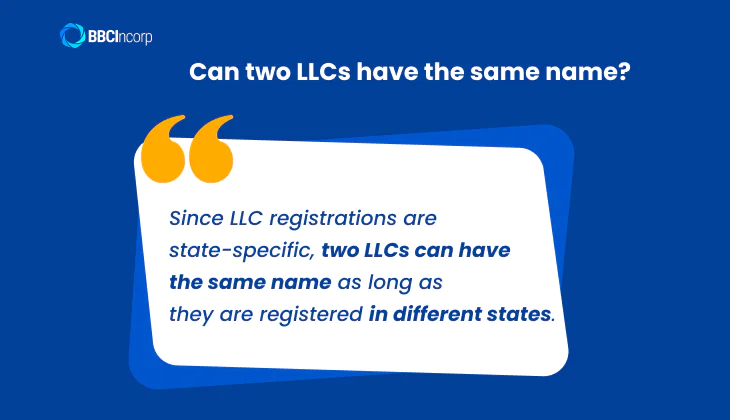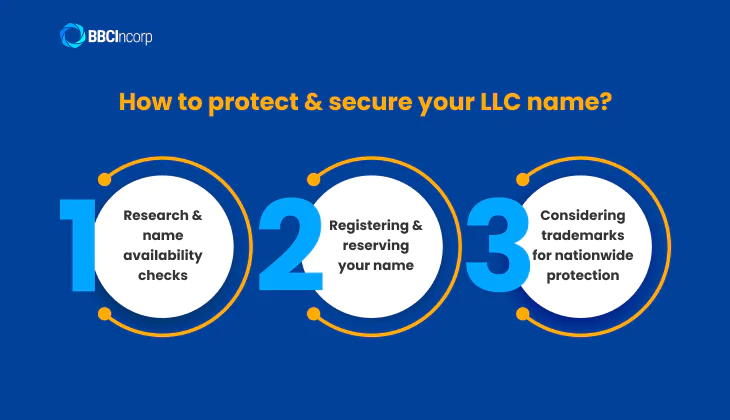
Table of Contents
Choosing the right name for your Limited Liability Company (LLC) is more than just a branding decision. It defines your business’s legal identity and impacts everything from customer trust to compliance with state and federal laws.
One question many entrepreneurs ask during this process is, “Can two LLCs have the same name in different states?” The answer lies in understanding how LLC naming laws vary by state and what that means for your business.
In this blog, we break down the rules around LLC naming, explore the risks and challenges of shared names across state lines, and provide practical steps to protect your name. Learn how to secure your business identity and stand out in today’s competitive market.
Can two LLCs have the same name?
LLC legal names
An LLC’s legal name is the official name registered with the state, serving as its unique identifier. Each state requires LLC names to be distinct and unique within that jurisdiction.
During the registration process, the state checks the proposed name against its database to ensure it’s not already in use or too similar to an existing name. Additionally, most states require business names to include identifiers like “LLC” or “Limited Liability Company”.
But can you have the same business name as someone else? The answer depends on a few factors. Since LLC registrations are state-specific, two LLCs can have the same name as long as they are registered in different states.
For example, “ABC Solutions LLC” could be registered in California, while another LLC with the same name might operate in Texas. However, federal trademark laws can override state permissions. If a business name is federally trademarked, no other company can use it across any state without authorization.

LLC DBA names
When forming a business, it’s important to understand the difference between DBA and LLC.
A DBA (Doing Business As) name allows an LLC to operate under a different trade or brand name. For example, “ABC Solutions LLC” might register a DBA as “ABC Consulting” to reflect its business focus.
Rules for DBA names vary by state. Some states allow multiple businesses to use the same DBA, while others require the name to be unique. However, it’s important to note that a DBA does not offer legal protection or exclusivity.
If a DBA name is federally trademarked, it receives broader protection, preventing other businesses from using it anywhere in the U.S. without permission. This is a key difference between state-level DBA registrations and federal trademarks.
Risks and challenges of sharing the same business name
While it might be allowed for two LLCs in different states to share the same name, it comes with significant risks and complications. Here’s what you need to know:
Risks of consumer confusion
If two businesses with the same name offer similar products or services, customers may have trouble telling them apart. This confusion can lead to lost sales or even harm your reputation if the other business has poor reviews or negative publicity.
Competition for online presence
The internet doesn’t recognize state boundaries. Sharing a name can lead to conflicts over domain names, social media handles, and search engine rankings. For example, two businesses called “GreenStreet LLC” might compete for the same “greenstreet.com” domain or Instagram handle. This increases marketing costs and makes it harder for customers to find you online.
Legal and growth challenges
If one business trademarks the shared name, it could legally bar the other from using it, even across state lines. Furthermore, sharing a name can restrict future growth, making it difficult to expand into new markets without undergoing a costly rebrand.
While the answer to “Can two companies have the same name?” may technically be yes, the risks and complications often outweigh the benefits. It’s crucial to carefully consider these factors before proceeding.
How to protect and secure your LLC name?

Step 1: Research and name availability checks
State-level search
Start by checking your desired business name through your state’s Secretary of State database. This step ensures that the name you want is not already in use by another registered business within your state.
Can an LLC have the same name in different states?
Keep in mind that LLC names are state-specific, meaning another LLC in a different state can legally have the same name as yours. If you’re planning to operate in multiple states, it’s worth checking name availability in each state to avoid potential branding conflicts.
Trademark search
Next, conduct a search on the U.S. Patent and Trademark Office (USPTO) database to ensure your business name doesn’t conflict with any existing federally registered trademarks. Tools like Namechk or Trademarkia can streamline this process and make it easier to identify potential issues.
Step 2: Registering and reserving your name
Once you’ve verified availability, submit your LLC registration with your state to secure exclusive rights to your legal entity name within that jurisdiction.
If you’re not ready to formally establish your LLC, many states allow you to reserve your business name temporarily (usually for 30-120 days) until you’re ready to file.
What to do if your desired name is already taken?
Modify your LLC name: Add descriptive or industry-specific terms to make your name unique. For example, if “Pinewood Solutions LLC” is taken and you operate in New York, you could rename your LLC to “Pinewood Solutions of New York LLC”.
Get creative with spellings or combinations: Experiment with unique spellings or combine words in original ways to avoid conflicts while maintaining a recognizable identity. Many successful businesses have used this strategy to stand out, such as Lyft or Flickr.
Step 3: Considering trademarks for nationwide protection
What is a trademark?
A trademark provides legal protection of your business name at the federal level, going beyond state boundaries. It ensures your name is safeguarded across the U.S., preventing others in similar industries from using it.
Why does trademark matter?
Trademarks are vital for businesses looking to expand nationwide. Even if you don’t plan to trademark your name today, another company could trademark it, restricting your ability to use the name outside your state or within competing industries.
How to register a trademark
- Conduct a trademark search on the USPTO database.
- Prepare your application with details about your business and intended use for the name.
- File through the USPTO Trademark Electronic Application System (TEAS).
The process typically takes 6-12 months but is well worth the investment if you want long-term legal protection.
Start your Delaware LLC with BBCIncorp
Thinking about the best state to register your LLC? Delaware is a top choice thanks to its business-friendly regulations. BBCIncorp is here to guide entrepreneurs through the process of Delaware LLC formation and protect their companies with expert support.
- Secure and register your LLC name
- Prepare and submit required documents to the Delaware Division of Corporations
- Designate a registered agent in Delaware
- Get assistance with setting up a bank account
- Receive ongoing compliance support to keep your LLC in good standing with the state
Conclusion
Choosing and securing the right name for your LLC is a crucial step toward building a successful brand. A common question many entrepreneurs ask is, “Can two LLCs have the same name in different states?” The answer is yes, since LLC names are registered at the state level. However, this can still lead to confusion or legal challenges if your business operates across state lines or if the name is trademarked nationally.
To avoid unnecessary confusion, legal trouble, or competition, follow the strategies outlined above and approach the naming process with intentionality. By prioritizing research, implementing trademarks for nationwide protection, and staying mindful of potential risks, your business will be well-positioned for long-term growth.
Looking for expert help? Explore BBCIncorp’s business name generator, or connect with our team to safeguard your brand from day one.
Disclaimer: While BBCIncorp strives to make the information on this website as timely and accurate as possible, the information itself is for reference purposes only. You should not substitute the information provided in this article for competent legal advice. Feel free to contact BBCIncorp’s customer services for advice on your specific cases.
Industry News & Insights
Get helpful tips and info from our newsletter!
Stay in the know and be empowered with our strategic how-tos, resources, and guidelines.





